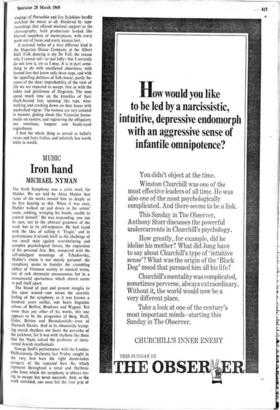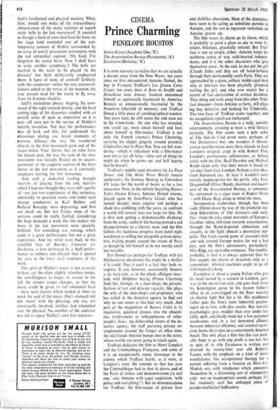Iron hand
MUSIC MICHAEL NYMAN
The Sixth Symphony was a crisis work for Mahler. We are told by Alma Mahler that 'none of his works moved him so deeply at its first hearing as this. When it was over, Mahler walked up and down in the artists' room, sobbing, wringing his hands, unable to control himself.' He was responding, one can be sure, not to the abstract greatness of the work but to its self-exposure. He had toyed with the idea of calling it Tragic,' and in performance it reveals itself as the challenge of one small man against overwhelming and complex psychological forces, the expression of his personal fate. But, compared with the self-indulgent moanings of Tchaikovsky, Mahler's vision is not merely personal: the symphony seems to transfer the crumbling edifice of Viennese society to musical terms, not of rich chromatic sensuousness but in a monumental spartanness which almost seems to pull itself apart.
The blood of past and present mingles in this open wound—one senses the atavistic feeling of the symphony as it was known a hundred years earlier, one hears linguistic echoes of Berlioz, Bruckner and Wagner. Yet more than any other of his works, this one appears to be the progenitor of Berg, Weill, Eisler, Britten and Shostakovitch—even of Maxwell Davies. And in its obsessively tramp- ing march rhythms one hears the pre-echo of the jackboot, for it was with rhythms like these that the Nazis solved the problems of intro- verted Jewish intellectuals.
Goerge Sze11's performance with the London Philharmonic Orchestra last Friday caught in the very first bars the right doom-laden savagery of the repeated bass As, which represent throughout a tonal and rhythmic yoke from which the symphony is always try- ing to escape but never succeeds. And, as the work unfolded, one soon felt the iron grip of Szell's intellectual and physical mastery. What, then, should one make of the extraordinary obtrusiveness of the many varieties of superb rustic bells in the last movement? It sounded as though a herd of cows had been let loose on the stage (and reminded one of the con- temporary cartoon of Mahler surrounded by an array of non-U percussion instruments with the not unfamiliar caption: 'My God, I've forgotten the motor horn. Now I shall have to write another symphony.') The bells are marked in the score to be played 'in the distance' but Szell deliberately emphasised them. A lapse of taste, of control? Unlikely with this conductor—rather the very uncontrol- ledness added to the terror of the moment, the ever present need for the music to fly away from its A minor shackles.
Szell's meticulous phrase shaping, his com- mand of the right textural density, and the hard cutting edge of his dynamics coupled with an overall sense of span as impressive as it is rare—all were put to the service of Mahler's volatile invention. Not that the performance was all bark and bite, for underneath the chromium plating one heard moments of extreme delicacy—the way the woodwind chorale in the first movement grew out of the major-minor 'Fate' theme, like an echo from the distant past; the way the tune of the slow movement was literally floated on its accom- paniment; or the exquisite sadness of the horn theme in the last movement as it constantly reappears striving for lost innocence.
And such a dedicated reading brought marvels of playing from the 1Po, marvels which I had not thought they were still capable of—my last two experiences of this orchestra, admittedly in specialist works and under such strange conductors as Karl Richter and Richard Bonynge, were depressing, and best not dwelt on. But last Friday none of the sections could be really faulted, considering the huge demands a work like this makes: the brass in the last movement were specially brilliant. Yet something was missing, which made it a great performance but not a great experience. And my mind went back to my youthful love of Bartok's Concerto for Orchestra, a love destroyed by a Szell perfor- mance so ruthless and efficient that it opened my eyes to the (very real) emptiness of the work.
The spirit of Mahler's music is not so easily broken, yet the often slightly relentless tempo, the unwillingness to linger, to savour to the full the minute tempo changes, so that the music could be given its full emotional head —these were factors which tended at times to mask the soul of the music. One's stomach did not 'move' with the phrasing, one was not emotionally involved, intellect had triumphed over the physical. No member of the audience was led to repeat Mahler's own first reactions.



































 Previous page
Previous page